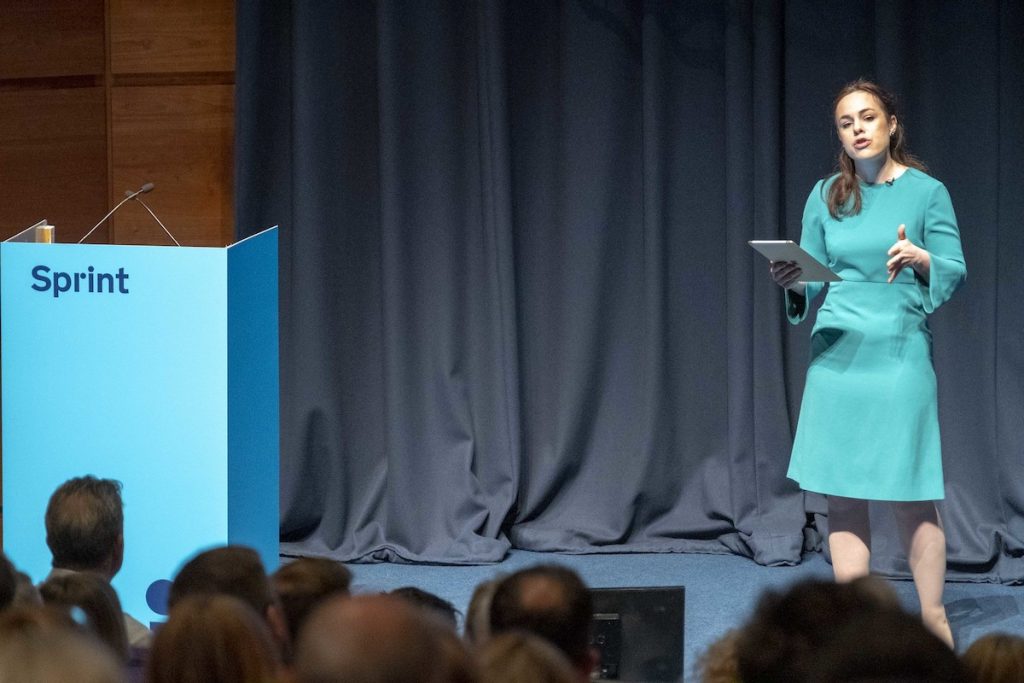The arrival into the world of Scotland’s Minister for Public Finance and the Digital Economy came at a momentous moment in the era of the information age.
In 1989, Tim Berners-Lee, the inventor of the World WideWeb, published his seminal paper Information management: A proposal. Two years later, he published the first website. Sandwiched between these two events was the birth, on 6 April 1990, of Kate Elizabeth Forbes. “People have only ever pointed out that I was born at the start of the tax year,” she says laughing.
Did she think that not having grown up in an analogue world was an advantage in her role? “Well, I would suggest that I grew up as the internet was growing up. I recall, in my early teens, the huge frustrations with dial-up when you were trying to get on MSN Messenger. Facebook launched just before I went to university. Spotify came along when I was at university.So, in a sense you don’t question; you just adopt.”
When Forbes was appointed in June, the announcement was notable for being the first time that the word digital had appeared in a ministerial title. For more than a decade, members of Scotland’s digital technologies sector had bemoaned the absence of a ‘digital champion’ within government or, at least, with the ear of government. In the manner that Martha Lane Fox, the founder of lastminute.com, was influential in bringing the operations of the UK Government into the digital age.
The moment for such a standard bearer in Scotland has passed, now that the iPhone has been in the world for as long. Still, from the outset Forbes made a point of meeting key organisations, companies, and people.Not just in the tech sector, but also in sectors where technology is increasingly important. She has been omnipresent at events and conferences.
“It’s been a priority for me, being visible as a government,” she said. “We are doing a lot of exciting things within government, such as CivTech, which I think we need to tell more people about. But, importantly, we are understanding what the digital technologies sector needs and how government can best them.
“There is a lot of ambition and a lot of confidence; it’s a vibrant sector. We have the leaders, we have the aspirations. But there’s also a realism in acknowledging the challenges that we need to overcome to be at the forefront of digital. It’s not about cities competing with cities, or Scotland competing with England – it’s about Scotland competing on a global stage. The number one challenge is around skills, recruitment and retention.
“Our strengths lie in areas such as data, fintech, digital health and social care. Where government can add value is to try and create an environment that people want to invest in, where there’s more international investment, that people want to move to Scotland to live and work in the tech sector. Where there is need for collaboration, say for example between academia and business, and public sector that we support that.”
Forbes cited the recent announcement of £1.5m Scottish Government funding to support the establishment of the UNICEF Data for Children Hub in Scotland in partnership with the international charity, The Data Lab and Edinburgh University. It will develop “data-driven collaborative solutions” to improve children’s wellbeing. “UNICEF is locating here because they recognisethe talent that exists here and the work that is ongoing around data,” she said.
Earlier this year, Forbes also announced the launch of a £6mInternet of Things (IoT) network that will “enable companies to innovate,providing low-cost access to next-generation connectivity, helping organisations develop new solutions and devices with global export potential,” she said.
“The network supports full commercial use of IoT in Scotland and will help transform the potential for businesses and the public sector to explore sensor and imaging applications, to pilot their ideas and then launch proven, sustainable products and services into the global market. If we want every area to benefit from technologies such as IoT – any business, any organisation, any third sector – then it needs to be publicly supported.”
For someone born on the cusp of a technological revolution, does she regard predicting the future part of government? “Our job, in part, is to predict what the next big technology is, to make sure we are ready to maximise how we can benefit.
“But our principal job is to make sure that we have the environment where invention, creation, and development happens – here in Scotland. Where academia is working with business, which is working with the public sector – to be a location of invention.”
Download a PDF of FutureScot magazine in The Times Scotland 15.12.18.
